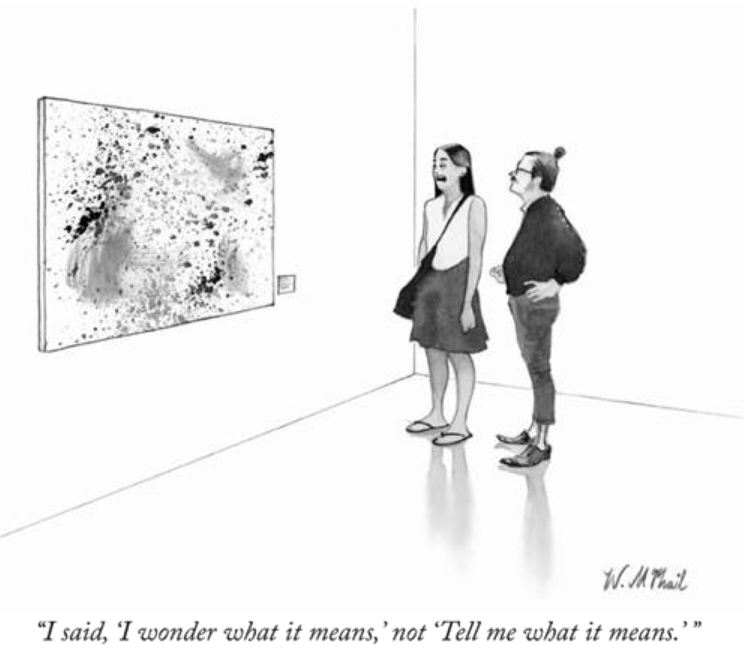
Logic and Conversation: Fall 2022
• Amsterdam • Master of Logic, University of Amsterdam
Traditionally, logic is concerned with the characterization of valid reasoning and argumentation, and therefore identifies the meaning of a sentence with its truth conditions. When analyzing the meaning of sentences in conversation, however, other notions become of interest as well. The focus of the course will be on inquisitive semantics, which enriches the traditional truth-conditional approach in ways that allow for a more comprehensive formal analysis of the meaning of sentences in linguistic interaction. The first part of the course introduces the basic inquisitive semantics framework. The second part discusses some current research in this area, concerning in particular the semantics of indeterminate phrases and unconditionals, and the integration of inquisitive semantics with dynamic semantics.


Term papers
The course has ended and has led to some very interesting term papers:
- Ferreol Lavaud: A note about propositional attitudes justification
- Elynn Weijland: A Uniform Account of the Dutch of in Inquisitive Semantics
- Ioli Tente: Intrigue, Puzzle, Fascinate and Theories of Clausal Complementation
- Flip Lijnzaad: Responding to negative biased polar questions using Dutch wel
- Sarah Dukic: How might generates alternatives when interacting with connectives
- Timo Diedering: Division of labour and high-negation polar questions
- Tianyi Chu: Inquisitive Semantics for Question-sensitive Awareness
Prerequisites
Good working knowledge of first-order logic is required (see for instance the first three chapters of this book). It is also convenient to have some background in formal semantics (see for instance this book), though this is not strictly required. For students of the Master of Logic, it is typically best to take this course in the second year of the programme, after having taken Meaning, Reference and Modality and Structures for Semantics during the first year. There may be exceptions, depending on your specific background.
Textbook
The first part of the course uses a textbook. The book is open access, so everyone can download a pdf for free. If you prefer a hardcopy, you can order one at amazon or other online bookstores.
Grading
The grade will be based on two homework assignments (each counting for 20%) and a final paper (60%).
Assignments
- A latex template for drawing inquisitive semantics diagrams can be downloaded here.
- Assignment 1 was posted on Monday 31/10 and was due on Monday 14/11 before class.
- Assignment 2 was posted on Monday 14/11 and was due on Monday 28/11 before class.
Instructions for final paper
The final paper must written individually. Please discuss possible topics with us early on in the course. Topics should be determined by November 30 at the very latest and should be communicated to us by that date. A preliminary version of the paper is to be presented during the last lecture on December 14, and the final version is due on December 22, 6pm. See Appendix B of the textbook and the inquisitive semantics website for pointers to some relevant literature, which may help in finding an interesting topic. We strongly encourage students to discuss their projects with each other and give each other feedback.
Grading criteria for final paper
The grading criteria for the final paper are the same as for a master thesis, though of course here we do not expect as much as in the case of a thesis.
- Correctness All claims should be correct, precisely formulated and carefully argued for.
- Writing The paper should be well-structured; the writing should be clear and concise. Typically, papers are around 10 pages. There is no official upper or lower bound, but quality is preferred over quantity: a single idea or result that is clearly explained in 7 pages is better than a collection of multiple half-baked ideas discussed in 15 pages.
- Difficulty Both conceptual and technical difficulty are taken into account.
- Originality The paper should contain some new results. This can take many forms: establishing previously unknown properties of one of the logical systems discussed in class, or closely related ones; further enriching the theories discussed; testing the predictions of the theories; developing new applications; developing a theory of your own that solves some of the remaining challenges for the theories discussed.
Late policy
Deadlines are strict. Late submissions will be accepted until three days after the deadline, but 0.5 points will be subtracted from the grade per day.
Schedule
Mondays 11.00-13.00, Wednesdays 11.00-13.00
| # | Date | Room | Material | Content | Lecturer |
|---|---|---|---|---|---|
| The basic inquisitive semantics framework | |||||
| 1 | 31/10 | L1.10 | Book chapter 1 | Motivation and overview (slides) | Floris |
| 2 | 2/11 | L1.14 | Book chapter 2 | Basic notions (slides) | Marco |
| 3 | 7/11 | L1.10 | Book chapter 3 | Operations on propositions (slides) | Floris |
| 4 | 9/11 | L1.14 | Book chapter 4 | First-order inquisitive semantics (slides) | Floris |
| 5 | 14/11 | L1.10 | Book chapter 5-6 | Question semantics (slides), for the exactly one implication of alternative questions see Roelofsen 2017 and Westera 2019. | Floris |
| 6 | 16/11 | L1.14 | Book chapter 8 | Inquisitive epistemic logic (slides) | Marco |
| 7 | 21/11 | L1.10 | Book chapter 9 | Comparison with other frameworks (slides) | Floris | Ongoing research: indeterminates, unconditionals and dynamic inquisitive semantics |
| 8 | 23/11 | L1.14 | Kratzer and Shimoyama 2002, Rawlins 2008 | Background on indeterminates and unconditionals (slides) | Marco |
| 9 | 28/11 | L1.10 | Degano and Aloni 2021 | Diachronic perspective on free choice indefinites | Marco |
| 10 | 30/11 | L1.14 |
Groenendijk et al 1996, Dotlacil and Roelofsen 2022 Sect. 1-2 |
Dynamic inquisitive semantics: motivation and core ideas (slides) | Floris |
| 11 | 5/12 | L1.10 | Class canceled | Floris | |
| 12 | 7/12 | L1.14 | Dotlacil and Roelofsen 2019 | A first-order dynamic inquisitive semantics (slides) | Floris |
| 13 | 12/12 | L1.10 | Dotlacil and Roelofsen 2022 Sect. 3-5 | Compositionality and assignment matrices (slides) | Floris |
| 14 | 14/12 | L1.14 | Project presentations | ||